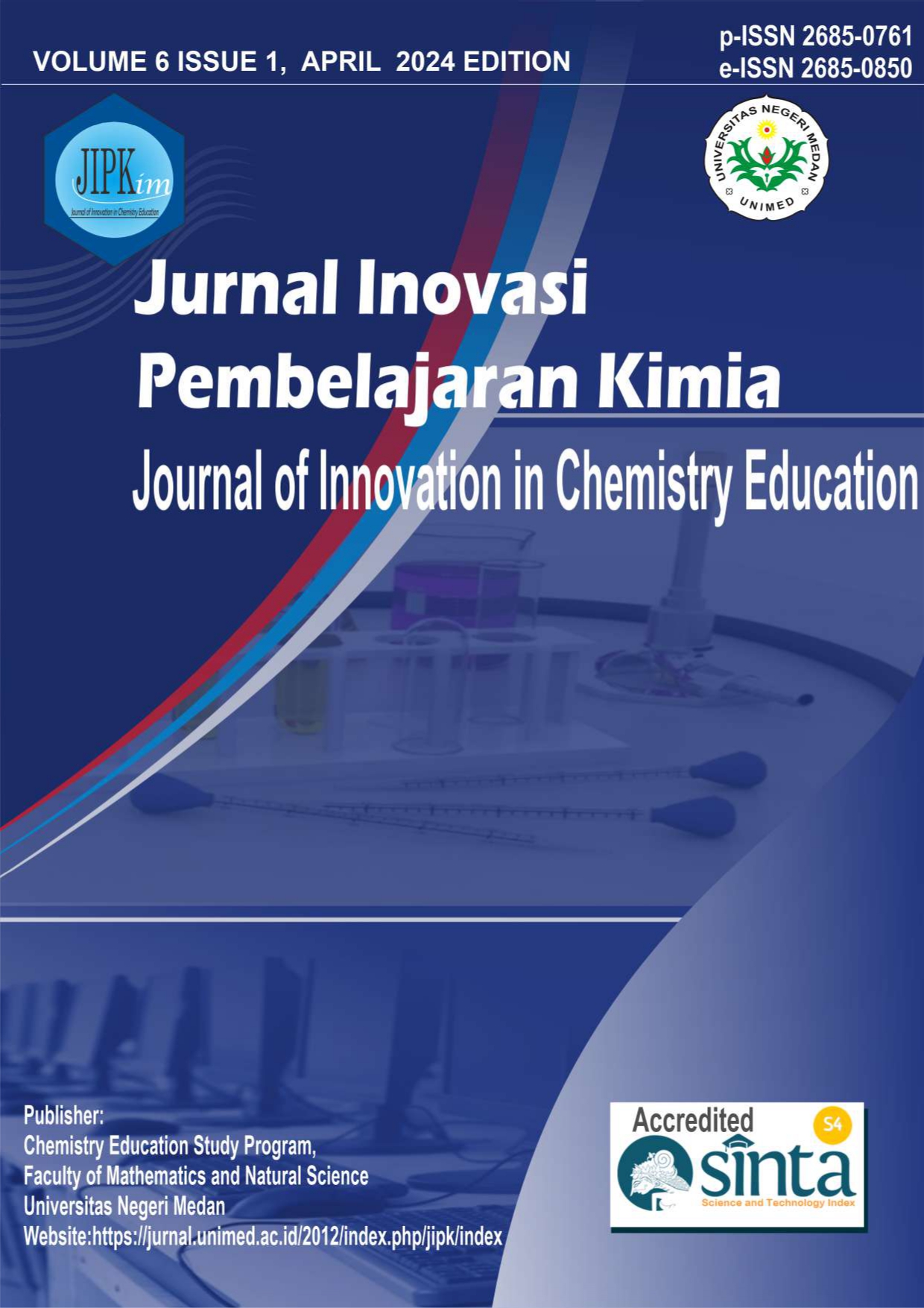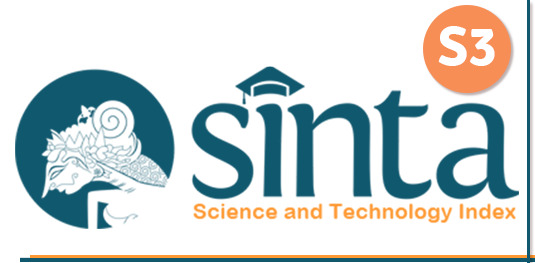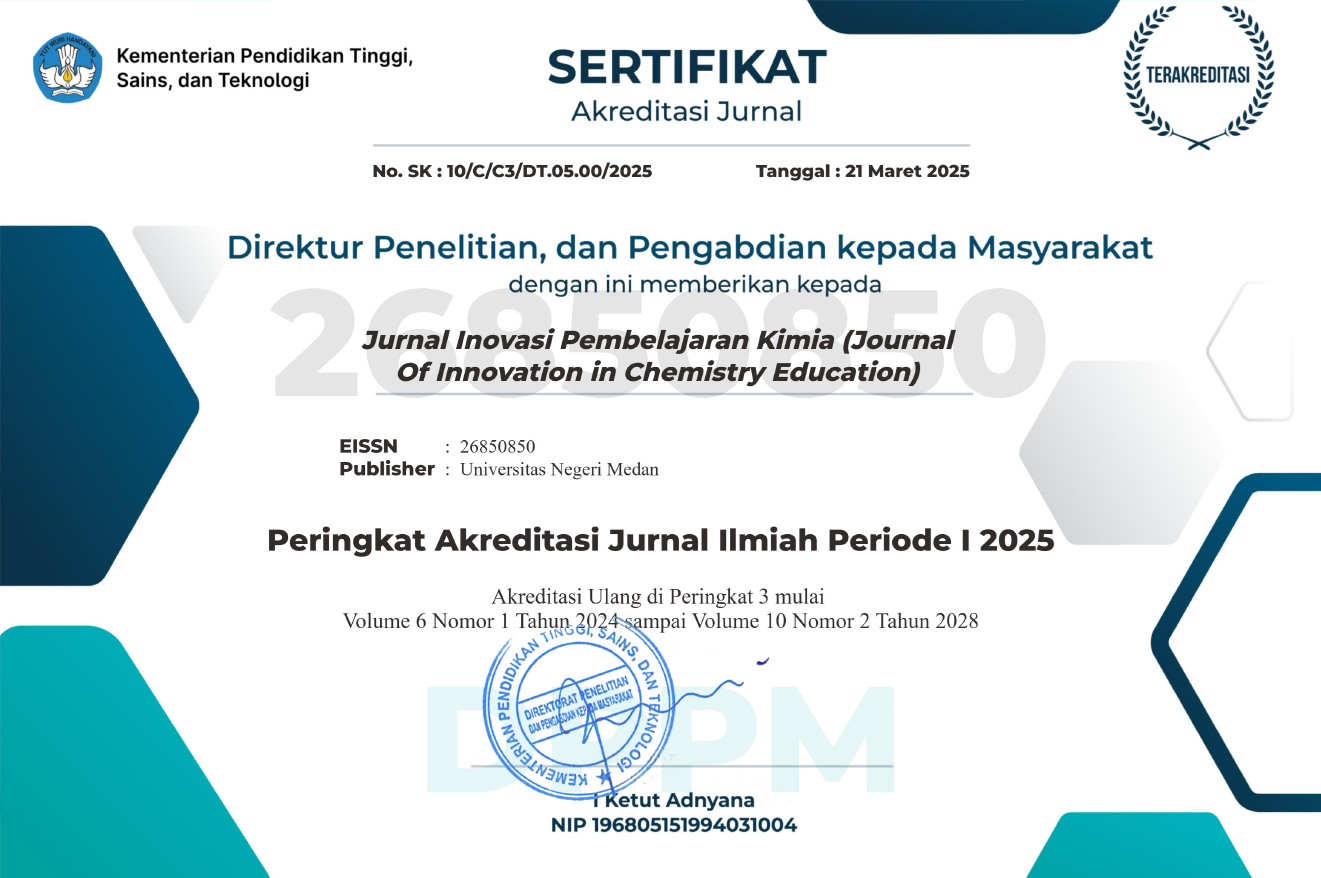Analysis of Students' Scientific Literacy Abilities with Application Problem Based Learning and Discovery Learning Models
DOI:
https://doi.org/10.24114/jipk.v6i1.57048Keywords:
Scientific Literacy Ability, Problem Based Learning, Discovery Learning, Animated Video Media, Chemical EquilibriumAbstract
The aim of this research is to determine the improvement and differences in students' scientific literacy abilities taught using the Problem Based Learning and the Discovery Learning model assisted by animated video media on chemical equilibrium material. The sampling technique was carried out using purposive sampling, resulting in class XI IPA 5, totaling 34 students, as experimental class I and XI IPA 6, totaling 36 students, as experimental class II. In learning, the test instrument uses cognitive levels C4 to C6. The results of students' scientific literacy abilities taught using the Problem Based Learning model have increased with an average value from 47.05 to 82.94, as well as the results of students' scientific literacy abilities taught using the Discovery Learning model, namely with an average value of 44.17 to 79.94. Through hypothesis testing using the Independent Sample T-Test with the prerequisites of normality and homogeneity, a Sig (2-Tailed) value of 0.024 was obtained, so it can be concluded that Ha is accepted. The results of this research show that there are differences in the scientific literacy abilities of students taught using the Problem Based Learning and the Discovery Learning model assisted by animated video media on chemical equilibrium material.References
Brata, W. W. W., Suriani, C., Simatupang, H., Siswanto, S., & Panggabean, F. T. M. (2020). Prospective Science Teachers™ Learning Independency Level on Blended Learning. Journal of Physics: Conference Series, 1462(1). https://doi.org/10.1088/1742-6596/1462/1/012070
Doyan, A., Susilawati, S., Gunada, I. W., & Hilfan, H. (2020). The Effect of Problem-Based and Discovery Learning Models with the Science Approach to the Understanding Concept and Science Process Skills of the Student. Proceedings of the 5th Asian Education Symposium 2020 (AES 2020), 566, 274“280. https://doi.org/10.2991/assehr.k.210715.058
Dzakwan, N. (2020). Konsep, desain, perbandingan kelebihan dan kekurangan, implikasi dari media pembelajaran animasi. Researchgate, May, 8“11.
Fitriana, F., Kurniawati, Y., & Utami, L. (2019). Analisis Keterampilan Proses Sains Peserta Didik Pada Materi Laju Reaksi Melalui Model Pembelajaran Bounded Inquiry Laboratory. JTK (Jurnal Tadris Kimiya), 4(2), 226“236. https://doi.org/10.15575/jtk.v4i2.5669
Ginting, F. A., Syahputra, R. A., Purba, J., Sutiani, A., & Dibyantini, R. E. (2022). Pengembangan Modul Berbasis Discovery Learning Terintegrasi Literasi Sains Pada Materi Laju Reaksi. Jurnal Inovasi Pembelajaran Kimia (Journal Of Innovation in Chemistry Education), 4(2), 167“176. https://doi.org/10.55904/educenter.v1i4.86
Hadiyati, S. A., Sudarti, S., & Handayani, R. D. (2022). Pengaruh Kemampuan Literasi Sains terhadap Minat Belajar Materi Pewarisan Sifat sebagai Evaluasi dalam Pembelajaran pada Siswa SMP. Jurnal Pendidikan Mipa, 12(4), 1210“1216. https://doi.org/10.37630/jpm.v12i4.766
Hariandi, J., Sitompul, S. S., & Habellia, R. C. (2023). Peningkatan Keterampilan Proses Sains Dengan Menerapkan Pendekatan STEM. Pendidikan Fisika, 11(2), 157“169. https://doi.org/http://dx.doi.org/10.24127/jpf.v11i2.7945
Hayun, M., & Syawaly, A. M. (2019). Pengaruh Penerapan Model Pembelajaran Problem Based Learning Tehadap Kemampuan Representasi Matematis Siswa Sekolah Dasar. Jurnal Instruksional, 2(1), 10“16. https://doi.org/https://doi.org/10.24853/instruksional.2.1.10-16
Hotimah, H. (2020). Penerapan Metode Pembelajaran Problem Based Learning Dalam Meningkatkan Kemampuan Bercerita Pada Siswa Sekolah Dasar. Jurnal Edukasi, 7(3), 5“11. https://doi.org/https://doi.org/10.19184/jukasi.v7i3.21599
Jusniar, J., & Syamsidah, S. (2021). Hubungan Konsep Diri Dengan Miskonsepsi Siswa Pada Konsep Kesetimbagan Kimia. Jurnal IPA Terpadu, 5(1), 96“102. https://doi.org/10.35580/ipaterpadu.v5i1.25499
Lepiyanto, A. (2017). Analisis Keterampilan Proses Sains Pada Pembelajaran Berbasis Praktikum. BIOEDUKASI (Jurnal Pendidikan Biologi), 5(2), 156. https://doi.org/10.24127/bioedukasi.v5i2.795
Meilasari, S., Damris, M., & Yelianti, U. (2020). Kajian Model Pembelajaran Problem Based Learning (PBL) Dalam Pemeblajaran Di Sekolah. Bioedusains : Jurnal Pendidikan Biologi Dan Sains, 3(2), 195“207. https://doi.org/https://doi.org/10.31539/bioedusains.v3i2.1849
Miasari, N. P., Sumantri, M., & Renda, N. T. (2020). Pengaruh Model Pembelajaran Discovery Learning Berbantuan Lingkungan Sekitar terhadap Hasil Belajar IPA. Journal for Lesson and Learning Studies, 3(2), 319“328.
Noormaliana, N. (2022). Penerapan Pembelajaran Model Discovery Learning Sebagai Inovasi Untuk Meningkatkan Hasil Belajar Kimia. Jurnal Studi Inovasi, 2(4), 14“20. https://doi.org/https://doi.org/10.52000/jsi.v3i1.124
OECD. (2017). PISA for Development Assessment and Analytical Framework: Reading, Mathematics and Science,. OECD Publishing.
Panggabean, F. T. M., Silitonga, P. M., & Sinaga, M. (2022). Development of E-Modules to Improve Students™ High Order Thinking Skills. AIP Conference Proceedings, 2659(November). https://doi.org/10.1063/5.0114397
Parera, L. A., Christianto, H., & Lazar, A. P. P. (2022). Pengembangan Video Pembelajaran dengan Bantuan Software Wondershare Filmora pada Materi Reaksi Reduksi Oksidasi. Jurnal Inovasi Pembelajaran Kimia (Journal Of Innovation in Chemistry Education), 4(1), 74-81. https://doi.org/10.24114/jipk.v4i1.33649
Pratama, D., Nugraha, W. S., & Mutaqin, E. J. (2023). Pengaruh Media Berbasis Video Animasi Terhadap Literasi Sains Siswa Kelas IV Sekolah Dasar Dalam Mata Pelajaran IPA. Urnal Pendidikan Sekolah Dasar, 3(1), 1“9. https://doi.org/10.31980/caxra.v3i1.1986
Rasyid, R. A., Anwar, M., & Musdalifah, M. (2022). Penerapan Model PBL Untuk Meningkatkan Hasil Belaja Peserta Didik Pada Materi Kesetimbangan Kimia. PROGRESIF: Jurnal Pendidikan Dan Profesi Keguruan, 2(1), 85“90.
Roza, M. H., & Damanik, M. (2022). Pengaruh Model PBL Terhadap Keaktifan Siswa dan Hasil Belajar Kimia SMA/MA pada Materi Koloid. Jurnal Inovasi Pembelajaran Kimia (Journal Of Innovation in Chemistry Education), 4(2), 157-166. https://doi.org/10.24114/jipk.v4i2.36101
Susi, S., & Yenti, E. (2020). Efektivitas Model Problem Based Learning Terhadap Keterampilan Proses Sains Siswa Sma Kelas XI Pada Materi Kesetimbangan Kimia. Jedchem (Journal Education and Chemistry), 2(2), 48“56. https://doi.org/10.36378/jedchem.v2i2.693
Yuliana, N. (2018). Penggunaan Model Pembelajaran Discovery Learning Dalam Peningkatan Hasil Belajaran Siswa Di Sekolah Dasar. Jurnal Imiah Pendidikan Dan Pembelajaran, 2(1), 21“28. https://doi.org/10.23887/jipp.v2i1.13851
Yunsyahana, F., Auliah, A., & Djangi, M. J. (2022). Keefektifan Model Pembelajaran Discovery Learning Terhadap Hasil Belajar Peserta Didik Kelas X MAN Bantaeng. Jurnal Inovasi Pembelajaran Kimia (Journal Of Innovation in Chemistry Education), 4(1), 92-100. https://doi.org/10.24114/jipk.v4i1.33436













